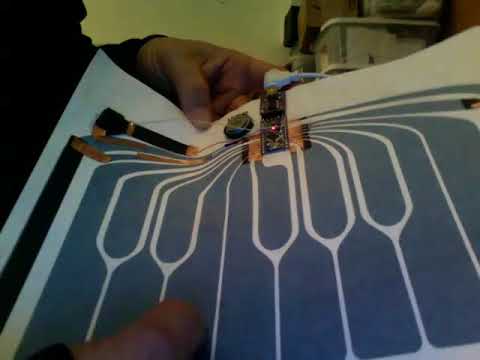- David Wessel’s IRCAM
- Organized Entanglement: Fiber and Textile Arts, Science and Engineering
- Managing Complexity with Explicit Mapping of Gestures to Sound Control with OSC
- Notations for Performative Electronics: the case of the CMOS Varactor
- A Synthesizable Hybrid VCO using SkyWater 130nm Standard-Cell Multiplexers
- A Recipe using OSC Messages
- Birds of the East Bay 2020
- Exercising the odot language in Graphics Animation Applications
- C++ container output stream header file
- Programming
Arduino
The Paper FingerPhone, a sustainably designed electronic Musical Instrument
Fri, 01/26/2018 - 15:00 — AdrianFreedThe next version used a pizza box as the resonator to demonstrate reuse as the sustainability aspect was emphasized..
Eventually it was placed on cardboard to be attached to poster board where it won "Best Poster" award at the NIME conference.
The conference paper associated with that poster presentation was chosen for inclusion in the NIME reader.
FastTouch Open Source Arduino Library for Fast, Portable, Low Fidelity Capacitive Sensing
Sun, 04/22/2018 - 12:40 — AdrianFreedThe example code provided with the library uses the Arduino Tone library to sound pitches according to which pins are touched.
Notice that each call to the fast touch library implements a cycle of a relaxation oscillator.
I am indebted to Alice Giordani for exemplifying use of the library so well in this dreamcatcher:
- AdrianFreed's blog
- Login or register to post comments
Introduction to Relaxation Oscillators
Wed, 04/11/2018 - 16:20 — AdrianFreed- AdrianFreed's blog
- Login or register to post comments
Ideas on Building Interactivity in Textiles and Related Fibers
Fri, 01/26/2018 - 15:42 — AdrianFreedFirst Paper Fingerphone Prototype
Mon, 01/15/2018 - 15:18 — AdrianFreed- AdrianFreed's blog
- Login or register to post comments
Conductive Paper Pressure Sensor and Arduino Teensy
Fri, 08/19/2011 - 19:27 — AdrianFreedOverhand knot in a strip of carbon-loaded paper becomes an FSR that can be easily connected to your favorite microcontroller (in this case a teensy running with the Arduino C++ tool chain).
This is part of my Fingerphone instrument.
- AdrianFreed's blog
- Login or register to post comments
Arduino Music and Sound Weekend Workshop in Berkeley
Fri, 07/02/2010 - 12:16 — AdrianFreedDates: July 24 + July 25, 2010 from 10am to 5pm FULL
During this hands-on workshop we will survey Arduino platforms, libraries, shields and programming techniques for a broad range of musical and sound applications. We will learn how to synthesize useful wave shapes including square, sine, triangle and pulses, how to manage polyphony and timing and how to playback and record sampled sounds.
- AdrianFreed's blog
- Login or register to post comments
- Read more
lilypad touch sound example
Sun, 06/27/2010 - 08:46 — AdrianFreed
// XYZ textile pad
// (procedural abstraction)
void analogPullup(int pin, boolean activate)
{
pinMode(14+pin, INPUT); // magic to active pullups 14 is the numbering of the analog pins
digitalWrite(14+pin, activate ? 































































